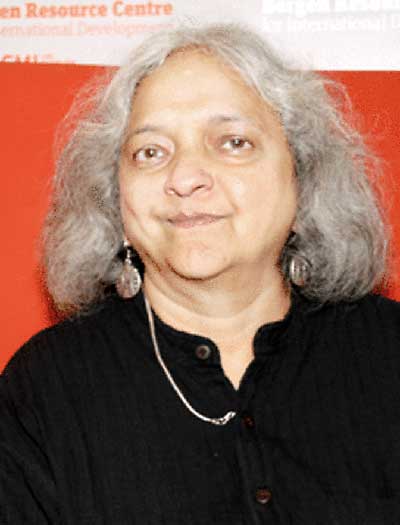Reply To:
Name - Reply Comment
(1)(1)(2)(1)(1)(1)(1)(1)(1)(1).jpg)
This week saw the death of Sunila Abeysekera, arguably Sri Lanka’s best known human rights activist. Abeysekera, 61, died at a private hospital in Colombo after a long battle with cancer.
Growing up in Colombo, Sunila Abeysekera’s interest in human rights began four decades ago, when it was not fashionable to dabble in the subject. Then in her early twenties, she was inspired by the aftermath of the 1971 insurrection of the Janatha Vimukthi Peramuna (JVP).
 She visited prisons where the rebel youths had been detained following the insurgency, to gainan insight into their grievances. When Regi Siriwardena formed the Human Rights Organisation-the first of its kind in the country-she was its Secretary. She was also a livewire of the Civil Rights Movement (CRM).
She visited prisons where the rebel youths had been detained following the insurgency, to gainan insight into their grievances. When Regi Siriwardena formed the Human Rights Organisation-the first of its kind in the country-she was its Secretary. She was also a livewire of the Civil Rights Movement (CRM).
It was to be the beginning of a life championing the cause of the underdog. In 1983, following the racial riots that many view as the beginning of the country’s battle against terrorism, Abeysekera was keen to establish links with Tamil groups. When she made that effort, some people even questioned her patriotism.
However, Abeysekera was equally critical of the Liberation Tigers of Tamil Eelam (LTTE), who were infamous for their ruthlessness and their scant regard for human rights. As a result, Abeysekera’s opinions came to be widely respected both locally and internationally.
In 1984, Abeysekera founded the Women and Media Collective through which she played a critical role in mobilising women in a wide range of causes. It ranged from women’s rights in the Free Trade Zone to equal wages for female workers in the tea plantations.
However, Abeysekera attracted public attention as an activist in the late eighties when JVP’s second insurrection was unleashed. The increasing authoritarianism seen in the late eighties saw Abeysekera thrust into the limelight, advocating for more democratic freedom.
That was not without its consequences. As Abeysekera emerged as a leading figure voicing her concerns about the youths who had disappeared and began criticising the tactics used to quell the JVP-led insurrection that crippled the country, she became a target of threats and intimidation.
In 1987, Abeysekera was compelled to leave the country after receiving death threats and witnessing the assassination of a colleague. She lived in the Netherlands for six months during which time she gave birth to her youngest daughter.
Abeysekera returned to Sri Lanka when the infant was only four-months-old to continue her work. In 1989, she played a pioneering role in the establishment of a group, INFORM, that undertook documentation of human rights abuses and disappearances. By bringing these issues to the attention of the international community, Abeysekera played a critical role in enabling the emergence of like-minded organisations as a force to reckon with in the evolving ethnic conflict in Sri Lanka.
Abeysekera was also a key figure in the formation of the Mother’ Front, an organisation formed in the late eighties to agitate against the disappearances of youth. This Front had the blessings of the then opposition led by the Sri Lanka Freedom Party (SLFP).
.jpg) Sunila Abeysekera was equally critical of the LTTE which was infamous for their ruthlessness and their scant regard for Sunila Abeysekera was equally critical of the LTTE which was infamous for their ruthlessness and their scant regard for .jpg) human rights. As a result, Abeysekera’s opinions came to be widely respected both locally and internationally human rights. As a result, Abeysekera’s opinions came to be widely respected both locally and internationally |
.jpg) In the last few years of her life, Abeysekera battled cancer with the same indefatigable energy that she pursued the causes she believed in, while human rights activists from around the world rallied to collect funds to support her. Sri Lanka and the world will be poorer as a voice for the underdog is stilled.
In the last few years of her life, Abeysekera battled cancer with the same indefatigable energy that she pursued the causes she believed in, while human rights activists from around the world rallied to collect funds to support her. Sri Lanka and the world will be poorer as a voice for the underdog is stilled.